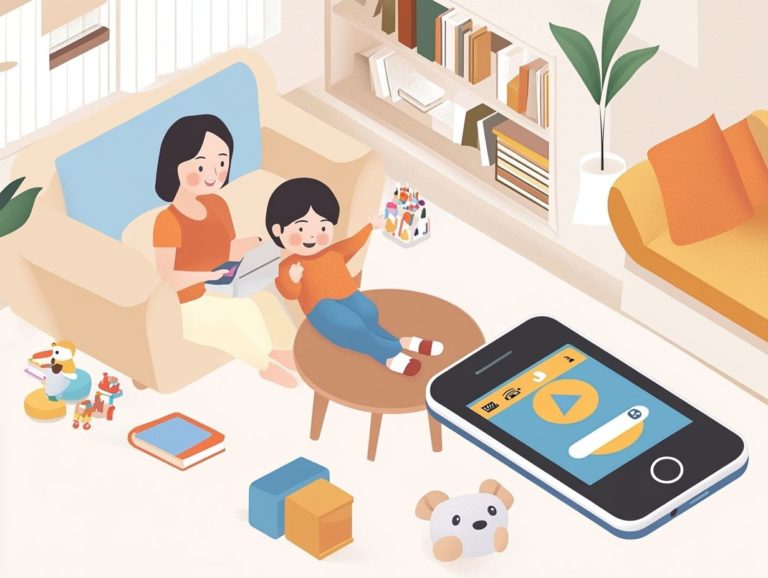Encouraging Emotional Intelligence Through Play
Emotional intelligence is an essential skill that influences the way you engage with yourself and those around you. Let s dive into the exciting world of emotional intelligence and discover its incredible benefits, particularly in children.
You’ll uncover how play acts as a powerful catalyst for developing crucial emotional skills such as self-awareness, self-regulation, empathy, and social competence. Engaging play activities that promote these abilities will be highlighted, along with practical tips for parents and educators to foster an environment where emotional intelligence can flourish.
Contents
- Key Takeaways:
- What Is Emotional Intelligence?
- Why Is Emotional Intelligence Important?
- How Can Play Help Develop Emotional Intelligence?
- How Does Play Help With Self-Regulation?
- How Does Play Help With Empathy?
- How Does Play Help With Social Skills?
- Understanding the Importance of Play in Emotional Development
- What Are Some Examples Of Play Activities That Encourage Emotional Intelligence?
- How Can Parents and Educators Incorporate Play Into Teaching Emotional Intelligence?
- Frequently Asked Questions
- What is emotional intelligence?
- How can play encourage emotional intelligence?
- What are some examples of play that can encourage emotional intelligence?
- At what age can children begin to develop emotional intelligence through play?
- How can parents and caregivers support the development of emotional intelligence through play?
- Are there any benefits to encouraging emotional intelligence through play?
Key Takeaways:

- Developing emotional intelligence is crucial for personal and social success.
- Play is a powerful tool for fostering emotional intelligence in children.
- Role-playing, board games, outdoor activities, and art are all effective forms of play that can encourage emotional intelligence.
What Is Emotional Intelligence?
Emotional intelligence (EQ) is your ability to recognize, understand, and manage your own emotions while also empathizing with those around you. This intricate skill set includes self-awareness, emotional regulation, and social awareness, enabling you to navigate social interactions with finesse and cultivate strong relationships.
Daniel Goleman, a leading psychologist, brought the concept of emotional intelligence into the spotlight with his influential work, highlighting its vital importance for both personal and professional success. By understanding your emotions better and deepening your understanding of emotional experiences, you can enhance your interpersonal skills and elevate your overall emotional well-being.
Why Is Emotional Intelligence Important?
Emotional intelligence plays a pivotal role in your personal and professional development, significantly shaping your social skills and enhancing your ability to communicate effectively with others.
With high emotional intelligence, you bolster your self-esteem and lay a solid foundation for successful problem-solving and conflict resolution. Organizations such as Playworks and the Housman Institute underscore the significance of emotional wellness in creating productive environments where individuals can truly flourish.
By nurturing your emotional intelligence, you not only elevate your own life but also positively impact those around you, fostering healthier social interactions and deeper relationships.
What Are The Benefits Of Developing Emotional Intelligence?
Developing emotional intelligence brings a wealth of benefits that can significantly elevate both your personal and professional relationships. When you cultivate high emotional intelligence, you gain greater self-awareness, enabling you to recognize your emotions and respond to various situations with finesse.
This heightened awareness fosters empathy and emotional regulation, enhancing your social interactions and boosting your self-esteem. Consequently, you become more adept at navigating conflicts and forging stronger connections with others, leading to an overall improvement in your well-being and satisfaction across different facets of life.
Take the workplace, for instance. With emotional intelligence, you re better equipped to manage stress and maintain your composure during challenging projects. This resilience not only inspires confidence in your team members but also nurtures a collaborative atmosphere that thrives on mutual support.
In your personal relationships, high emotional intelligence allows you to stay attuned to your partner s feelings, paving the way for deeper connections and more effective conflict resolution. The journey of personal growth unfolds as you learn to manage your emotions, which enhances your decision-making and imbues your life with a greater sense of purpose and fulfillment. Resources like the Emotional Wellness Playbook and insights from experts like Talia Filippelli can guide you in this journey.
Ultimately, the cumulative effects of emotional intelligence create a profound impact, enriching your interactions and promoting success in a variety of settings.
Start today by incorporating fun play activities into your routine to boost emotional intelligence in children!
How Can Play Help Develop Emotional Intelligence?
Play acts as a crucial vehicle for nurturing emotional intelligence in children, offering a natural setting where they can learn vital social skills. Engaging in various forms of play be it cooperative games or role-playing allows them to hone their emotional regulation, problem-solving abilities, and creativity. Experts such as Lauren Sturtz emphasize the importance of play in emotional development.
This playful exploration not only sharpens their capacity to recognize and articulate their feelings but also cultivates interactions that encourage empathy and understanding among their peers. Through these enriching experiences, children lay a solid groundwork for emotional intelligence, equipping themselves for future success in social interactions and overall emotional well-being.
Types of Play That Boost Emotional Intelligence
Engaging in various types of play can significantly enhance the development of emotional intelligence in children. Cooperative games, role-playing, and specialized activities aimed at emotional identification are particularly effective.
Through cooperative games, you foster teamwork and communication skills. Role-playing scenarios allow children to step into different perspectives and articulate their feelings. Resources like Childhood 101 and Play Based Parenting offer valuable insights into games specifically designed to nurture emotional intelligence. These activities not only immerse children in delightful, interactive experiences but also equip them with vital skills to navigate their emotional landscapes and social environments more adeptly.
These play types involve children in a multifaceted learning process. For example, cooperative games such as ‘The Trust Fall’, ‘Puzzle Challenge’, and ‘Stop Relax Think’ promote teamwork and build a sense of community by requiring collaboration and mutual support.
Role-playing activities like ‘Emotion Charades’, ‘What Would You Do?’, ‘Simon Says’, or ‘Which Emotion Am I’ encourage empathetic understanding as children act out various emotional scenarios, allowing them to practice appropriate emotional responses. Activities like creative activities that help express feelings or storytelling enable children to articulate their feelings, enriching their emotional vocabulary.
As children immerse themselves in these playful yet meaningful experiences, they not only enjoy their time but also cultivate essential emotional skills that will serve them well throughout their lives.
How Does Play Help With Self-Awareness?
Engaging in play significantly enhances your self-awareness, especially as a child, by providing a safe space to explore and express your feelings. Through role-playing and imaginative scenarios, you identify your emotions and learn to communicate them effectively. This playful exploration fosters emotional identification, enabling you to recognize not only your own feelings but also those of others a vital aspect of emotional intelligence. As you navigate different characters and situations, you gain valuable insights into your emotional responses, further enhancing your self-awareness. Utilizing resources like the Social and Emotional Competence Game can be particularly effective in this learning process.
One effective approach is dramatic play, where you act out scenes from stories or your daily life, allowing you to process and reflect on your feelings. For example, when you play the role of a doctor, you might confront feelings of concern or empathy, which helps you recognize and understand these emotions within yourself.
Group games that require teamwork and cooperation can also illuminate how people interact with each other, prompting discussions about feelings like frustration or joy during play. These activities help you express your emotions confidently while cultivating an understanding of how your behaviors impact those around you, ultimately nurturing a deeper sense of self-awareness. Incorporating tools from Child Therapy Toys and practices like Self-Esteem Jenga can further enhance this learning process.
Start incorporating these playful activities today to boost your child s emotional intelligence!
How Does Play Help With Self-Regulation?

Play is an incredibly powerful tool for nurturing self-regulation the ability to manage one’s own emotions and behaviors in children. It offers them the chance to navigate emotional landscapes through a variety of scenarios and challenges. By participating in structured games and activities, children learn to manage their feelings and responses, all while honing essential problem-solving skills.
Consider activities like role-playing or board games: they require participants to adapt to ever-changing circumstances and outcomes, fostering critical thinking and adaptability. When you engage children in a game like ‘Red Light, Green Light’, they not only sharpen their impulse control but also learn to interpret and respond appropriately to cues from others. Games like ‘Fox and Rabbit’ further enhance their ability to stay focused and regulated.
Team-based sports like soccer and basketball promote collaboration and communication, allowing children to develop emotional awareness as they experience wins and losses together. These playful experiences create a rich environment for cultivating resilience, social skills, and the ability to self-regulate in various situations, demonstrating that play is indeed a vital component of a child s developmental journey. Books by Ciarrochi et al., which focus on emotional intelligence, and materials from the Creative Therapy Store, which offer therapeutic play resources, provide further guidance on these concepts.
Encourage your child to engage in these activities and witness how play can foster their emotional growth!
How Does Play Help With Empathy?
Play significantly enhances a child s capacity for empathy by providing them the opportunity to step into various roles and perspectives during interactions. Through role-playing and engaging in diverse social scenarios, children can gain a deeper understanding of the feelings and experiences of others. This immersive approach to play not only nurtures their emotional intelligence but also facilitates meaningful social interactions and emotional regulation.
As you encourage your child to practice empathy during play, they will learn to respond appropriately to the emotions of others, fostering deeper connections and understanding among their peers. This helps in developing critical social skills and self-awareness.
Activities such as cooperative games, storytelling, and creative drama can greatly enrich this learning experience. For instance, when your child participates in role-playing scenarios where they act as characters facing different challenges, they engage their empathy by navigating the emotions and experiences of those characters. Games like Simon Says and Stop Relax Think can also be integrated to practice emotional identification and regulation.
Group activities that require collaboration, like building a fort or organizing a pretend market, encourage effective communication and the sharing of feelings. These moments of imaginative play not only expand your child’s social skills and development but also equip them with the essential tools to cultivate lasting relationships grounded in empathy.
Try incorporating these activities into your child’s playtime to help them develop a strong empathetic foundation!
How Does Play Help With Social Skills?
Play is a fun and powerful way to help children develop essential social skills! It fosters communication and collaboration during various activities and contributes to their overall social and emotional competence.
When you engage your child in games like team sports or cooperative board games such as ‘Pandemic’ or ‘Forbidden Island’, they are given valuable opportunities to work together in strategizing and decision-making. These activities prompt them to listen actively to one another s ideas and perspectives, creating an environment where effective communication can thrive. Games for emotional intelligence like ‘Which Emotion Am I’ and ‘Social and Emotional Competence Game’ can also be beneficial.
Role-playing and imaginative scenarios, like setting up a restaurant or store , serve as excellent platforms for your child to practice negotiation and problem-solving skills while they negotiate roles and share responsibilities. These experiences not only help to cultivate friendships but also equip children with the social tools necessary to navigate a variety of interpersonal interactions and enhance their development.
Encourage your child to participate in these fun activities to build their social skills and confidence!
Understanding the Importance of Play in Emotional Development
Play is a crucial component in enhancing motivation and developing emotional intelligence. Through engaging in various play activities, individuals can boost their self-esteem and learn valuable life skills. This section explores how play can be a powerful motivator and a key to emotional growth.
How Does Play Help With Motivation?
Play serves as a remarkable motivator for you, enhancing your self-esteem and encouraging active participation in learning activities.
When you engage in enjoyable and interactive play experiences, you’re more likely to develop a genuine intrinsic motivation to explore and learn an essential component of emotional intelligence and self-awareness.
Cooperative games and creative activities inspire you to take risks and express yourself, reinforcing your sense of accomplishment and self-worth. This motivation not only builds your emotional development but also cultivates a lifelong love for learning.
Activities like Self-Esteem Jenga and games from Child Therapy Toys can further boost self-esteem and emotional wellness.
Engaging in imaginative play, like role-playing as superheroes or constructing worlds with blocks, allows you to experiment with social roles and emotions. Ultimately, this increases your empathy and interpersonal skills.
These experiences provide a safe haven for you to navigate your feelings, fostering resilience in the face of challenges. The Emotional Wellness Playbook by Housman Institute offers great guidance on integrating these elements into play.
Through team sports or collaborative group tasks, you learn to work together towards shared goals, further enhancing your communication abilities. In the end, by linking fun activities to valuable life skills, play not only motivates you but also lays a solid foundation for your future interactions and emotional growth.
Experts like Talia Filippelli and Lauren Sturtz emphasize the importance of these activities in developing emotional intelligence.
What Are Some Examples Of Play Activities That Encourage Emotional Intelligence?
You ll discover a wealth of engaging play activities designed to develop emotional intelligence in children. These activities provide dynamic avenues to build essential social and emotional skills.
Resources like Playworks and Childhood 101 offer excellent ideas for such activities.
Role-playing games invite children to immerse themselves in various characters and scenarios, cultivating empathy and deepening their emotional understanding.
Cooperative games emphasize teamwork and communication, offering valuable opportunities for practicing emotional regulation and honing problem-solving abilities. Games like Fox and Rabbit are excellent examples.
These playful experiences do so much more than just entertain! They foster crucial emotional competencies that will serve children well throughout their lives.
For further reading, check out Ciarrochi et al. on emotional intelligence and developmental psychology.
Role-Playing Games
Role-playing games serve as a remarkable tool for enhancing your emotional intelligence. They invite you to explore diverse perspectives and express a wide array of feelings.
By immersing yourself in various characters and scenarios, you learn to identify and understand emotions not just your own, but also those of others around you. The Conversational EQ framework by Daniel Goleman can offer further insights into these dynamics.
This interactive form of play hones your social skills and builds your problem-solving abilities as you navigate different social situations and conflicts within the game.
Resources from the Creative Therapy Store offer various tools and games to enhance these skills.
Take games like Dungeons & Dragons and Monsterhearts, for example. They create rich narratives where you must communicate effectively and collaborate with fellow players to overcome challenges.
In Dungeons & Dragons, you often encounter moral dilemmas that require you to empathize with characters and critically evaluate your choices. This process strengthens your ability to navigate real-life emotions and relationships.
Monsterhearts, on the other hand, delves into the complexities of teenage angst and interpersonal drama, allowing you to confront and articulate your feelings in a supportive environment.
Through these engaging experiences, you not only expand your emotional vocabulary but also gain valuable insights into social dynamics. This makes you more empathetic and emotionally intelligent in your everyday interactions.
For more on this topic, see works by Play Based Parenting to explore additional resources that can further enhance your understanding.
Board Games
Board games stand out as exceptional arenas for cultivating emotional intelligence. They facilitate social interaction, communication, and cooperation among players. As you engage in these games, you’ll find that many require collaboration and strategic thinking, enhancing your ability to read social cues and interpret emotional responses.
These games offer valuable opportunities for practicing emotional regulation and developing skills crucial for navigating both competition and teamwork key elements of emotional intelligence. Take, for example, games like ‘The Mind.’ They challenge you to synchronize your thoughts without uttering a word, fostering nonverbal communication and empathy.
Similarly, ‘Dixit’ invites you to delve into storytelling and interpret abstract images, allowing you to express your emotions while intuitively grasping the perspectives of others. In ‘Pandemic,’ you and your teammates must engage in cooperative problem-solving, managing stress and emotions as you combat global challenges together.
These examples beautifully illustrate how immersing yourself in board games transforms learning into an enjoyable experience. They also equip you with essential social skills to navigate real-world interactions with greater ease and effectiveness.
Outdoor Activities

Engaging in outdoor activities offers an excellent opportunity for children to cultivate emotional intelligence through teamwork and social interactions. Activities like team sports, scavenger hunts, and obstacle courses compel children to collaborate, communicate, and manage emotions with friends.
These experiences enhance their physical capabilities while fostering essential social and emotional skills crucial for personal development. Outdoor games like Social and Emotional Competence Game by Childhood 101 are excellent choices.
Take soccer, for instance. It doesn t just teach kids about strategy and cooperation; it also equips them to handle competition and frustration, nurturing their resilience in the process.
Similarly, a scavenger hunt encourages participants to share ideas and work together toward a common goal, fostering relationships with others and teaching them to appreciate diverse perspectives. These activities can be found in guides like the Emotional Wellness Playbook.
Through these shared experiences in a natural setting, children learn to express themselves more effectively and resolve conflicts. They ultimately emerge with invaluable skills that will serve them well in the classroom and beyond. For further reading, check out Childhood 101 and Playworks on outdoor activities for emotional intelligence.
Art and Creativity
Art and creative activities serve as exceptional pathways for nurturing emotional intelligence. They offer you the opportunity to express feelings and experiences in truly unique ways. Artistic play encourages creativity and emotional self-awareness.
By engaging in artistic endeavors, you promote self-expression and create a powerful channel for processing emotions. This deepens your understanding of various emotional experiences.
These creative activities encourage innovative thinking and foster essential problem-solving skills, equipping you for a wide array of social situations. Emotional self-awareness is a key aspect of this process.
Through practices like painting, storytelling, or music, you can dive into and communicate your inner world without the limitations of language. This unlocks the ability to articulate complex feelings.
For example, creating a visual representation of your emotions using colors and shapes can help you identify and label those feelings. Resources from the Creative Therapy Store provide tools and activities for this purpose.
Participating in group art projects can enhance teamwork and refine your interpersonal skills. Workshops featuring drama or dance invite you to embody different emotions, providing a safe space to explore and reflect on your feelings.
This ultimately enriches your emotional vocabulary, resilience, and self-esteem. Take part in these activities today and watch your emotional intelligence soar!
How Can Parents and Educators Incorporate Play Into Teaching Emotional Intelligence?
Parents and educators hold a vital position in weaving play into the fabric of teaching emotional intelligence. They craft supportive environments that foster children’s emotional growth.
By purposefully incorporating play activities into their teaching approaches, parents and educators can cultivate essential emotional skills such as self-awareness, empathy, and emotional regulation. Encourage open discussions about feelings and utilize tools like the Emotional Wellness Playbook. Modeling emotional intelligence in everyday interactions reinforces these lessons. This allows children to develop a richer understanding of their own emotions and those of others.
Creating a Safe and Supportive Environment
Creating a safe and supportive environment is crucial for nurturing emotional intelligence through play. It allows children to explore and express their emotions freely. When children feel secure, they are more inclined to engage in play activities that foster empathy, self-awareness, and emotional regulation.
This nurturing atmosphere encourages open discussions about feelings and emotional experiences, enabling children to gain a deeper understanding of their own emotions and those of others. Resources like the Emotional Wellness Playbook can be invaluable in this regard.
You can enhance emotional safety by ensuring consistent and positive interactions with caregivers. Establish ground rules that promote respect and safety during play. This approach builds greater trust and gives children the confidence to voice their thoughts and feelings openly. It also reinforces their communication skills and overall emotional intelligence.
Integrating play scenarios that involve role-playing or collaborative games is an effective way to help children recognize and manage their emotions. This nurtures friendships and hones conflict resolution skills. For example, games like “Which Emotion Am I” can be particularly useful. As a result, children will navigate social situations with increased ease, appreciating diverse perspectives and developing resilience in facing various emotional challenges.
Encouraging Open Communication
Encouraging open communication about feelings and emotions is essential for developing emotional intelligence through play. By creating an atmosphere where children feel free to express themselves, you can open the door to meaningful discussions about their emotional experiences.
This practice enriches their emotional vocabulary and hones their social skills, allowing them to better understand and empathize with the feelings of others during play. Games like “Stop Relax Think” provide excellent opportunities for this kind of learning.
Engaging in role-playing activities or storytelling can serve as effective strategies for helping children articulate their emotions. When they step into different characters, they explore a range of feelings and perspectives, which fosters understanding and empathy.
Activities like the Social and Emotional Competence Game can also be beneficial. You can model open communication by sharing your own feelings during play. This sets a precedent and creates a safe space for children to do the same.
Conversations that arise after a game or play session can lead to valuable insights on managing emotions in real-life scenarios. This nurtures well-rounded individuals who are equipped with strong emotional intelligence.
Using Play to Address Specific Emotions or Situations
Using play to address specific emotions or situations is a highly effective strategy for teaching emotional intelligence. It allows you to help children process and manage their feelings within a safe context.
By engaging in structured activities, children can explore various emotional challenges through imaginative scenarios. For instance, they might role-play a situation where one child feels left out. This scenario provides them with an opportunity to recognize and articulate feelings of exclusion, while their peers model empathy and support.
This can help build self-esteem and make kids more confident in social interactions. Problem-solving games like “feelings charades” and “Simon Says” encourage kids to identify and express emotions non-verbally, enhancing their awareness and understanding.
Through these interactive experiences, they refine their coping strategies, improving their ability to discuss feelings openly and constructively. Play is a powerful tool in emotional development, guiding children as they learn to navigate complex feelings with creativity and confidence.
Resources like the Creative Therapy Store and insights from experts such as Daniel Goleman and Talia Filippelli can provide further support.
Modeling Emotional Intelligence
Modeling emotional intelligence is essential for you as a parent or educator. Children often absorb lessons through observation and imitation.
By showcasing healthy emotional responses and effective communication in your daily interactions, you offer powerful examples for children to emulate. Incorporating emotional intelligence into play activities allows you to demonstrate empathy, self-awareness, and emotional control, reinforcing the lessons learned during play.
This approach enhances children’s social skills and fosters their ability to manage emotions in various situations. Engaging in role-play scenarios can vividly illustrate different emotional responses, helping children navigate their feelings.
Encourage them to express what they re feeling during playtime. Guide them to articulate their emotions and gain insight into the perspectives of their peers. Using resources like Child Therapy Toys can also assist in this process.
By creating a safe environment for open communication, you can enable future generations to develop strong emotional intelligence, an essential component of their overall well-being.
For more insights on emotional intelligence through play, consider resources by Lauren Sturtz and Ciarrochi et al.
Frequently Asked Questions

Here are some common questions about emotional intelligence and play.
What is emotional intelligence?
Emotional intelligence refers to the ability to recognize, understand, and manage one’s own emotions, as well as the emotions of others. It involves empathy, self-awareness, and effective communication.
How can play encourage emotional intelligence?
Play provides a safe and fun environment for children to explore and express their emotions. Through various play activities, children can learn to identify and regulate their emotions, as well as develop empathy and social skills.
What are some examples of play that can encourage emotional intelligence?
Some examples of play activities that can encourage emotional intelligence include role-playing, artistic expression, and cooperative games. These activities allow children to express their emotions and practice important social and emotional skills.
Games like “Self-Esteem Jenga” and “Stop Relax Think” are also effective in nurturing emotional growth.
At what age can children begin to develop emotional intelligence through play?
Children can begin to develop emotional intelligence through play as early as infancy. As they grow and develop, play continues to be an important tool for fostering emotional intelligence.
How can parents and caregivers support the development of emotional intelligence through play?
Parents and caregivers can support the development of emotional intelligence through play by providing a variety of play opportunities. Encourage imaginative play and model healthy emotional expression and regulation.
Utilizing resources such as the “Social and Emotional Competence Game” can also support this development.
Start incorporating these playful techniques today to nurture emotional intelligence in children!
Are there any benefits to encouraging emotional intelligence through play?
Playtime isn’t just fun; it’s a vital way to build emotional intelligence! There are many benefits to encouraging emotional intelligence through play.
It helps children develop strong social and emotional skills. This improves their communication and problem-solving abilities while helping kids feel better overall and bounce back from challenges.






